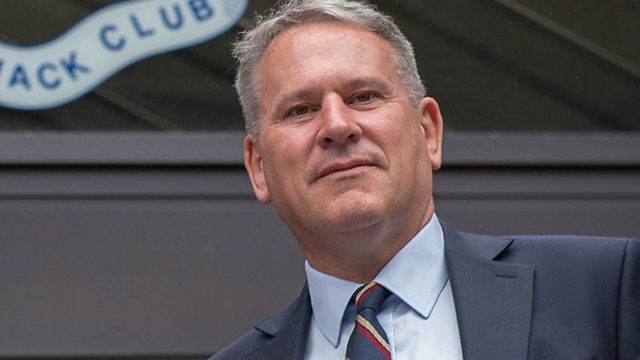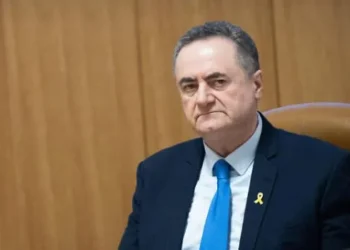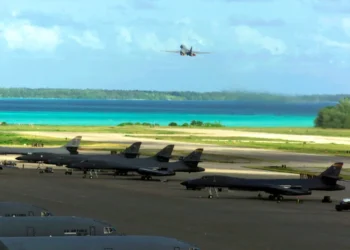Richard Kemp has spent most his life fighting terrorism and insurgency, commanding British troops on the front line of some of the world’s toughest hotspots, including Afghanistan, Iraq, the Balkans and Northern Ireland. He is now a writer, journalist, media commentator and motivational speaker. He provides strategic consultancy services on leadership, security, intelligence, counter-terrorism and defense. Radio Free Europe spoke to him about the Ukraine-Russia war.
What should we expect of the new British PM? What will the change in leadership mean for Ukraine when it comes to UK support?
When he was Chancellor of the Exchequer, Rishi Sunak was a strong supporter of Boris Johnson’s extremely strong support for Ukraine. And everything I’ve seen of Sunak, everything he has said, suggests to me that he will be just as strong a supporter, and Britain will remain one of the strongest allies that Ukraine has in the world.
So Kyiv shouldn’t be wary that as the war drags on, the focus in the UK will shift towards more domestic matters?
There’s always a risk, of course, the longer a war drags on, and the more money it costs, and the more it has an impact on people in Europe as a whole, not just Britain, the more problematic it becomes to continue to support it. And we’ve seen the impact of this war in Europe on the European population. Obviously, compared to Ukraine and Ukrainians, it just doesn’t compare, we’re not the people losing their lives. But Europeans are having their livelihoods undermined by the increase in the cost of living as a direct result of the war. And that’s something that takes its toll. And I think it’s a problem that’s going to get worse as the winter goes on. Britain is in a better position than most because we don’t rely so much on Russian energy. But of course, the market price of energy goes up for Britain just as it does for everybody else. So, I wouldn’t say there’s going to be unwavering support from the population, but I think certainly the British government will do all it can to keep Britain as firmly behind Ukraine as it has been up till now.
What would this potential faltering of support translate into when it comes to Kyiv’s relationship with the Western governments? Could we see a scenario where the West, perhaps not so gently, nudges Ukraine towards some sort of unfavorable settlement?
I think the longer it goes on, the more problematic it all becomes. And I do believe that Ukrainian successes make a difference when it comes to the level of support. Up until August, when Ukraine launched its successful counter-offensive in Donbas and around Kharkov, there was a bit of a wavering because people were suffering. And I would stress again, when I say people in Western Europe or Eastern Europe are suffering, I don’t, by any means, compare it to the suffering of the people in Ukraine, it’s a different form of suffering. They’re not dying, they’re not being wounded, they’re not being driven out of their houses, but, nevertheless, in terms of lifestyle and important aspects of their lives, they are suffering. But when they see the fruits of what they have given to Ukrainians, both in terms of the sanctions, and in terms of finance, they can see that there is some success coming from it all. And I think if Ukraine is able to keep up the momentum in the war, the level of support is likely going to be easier to maintain.
Let’s also discuss the effects of the war dragging on for the opposite side. Do we expect the Russian resolve to falter?
In the earliest days of the war, Russia had some very big successes, not so much in their initial attempt to end the war quickly and bring down the government in Kyiv. That failed. But they did have big gains in the south, including, of course, Kherson, as the first major city they took. But then, since August, we’ve seen Russia being effectively humiliated by Ukraine. And that, of course, must have an effect on the level of support in Russia for the war. And we’ve seen open criticism by some of Putin’s main allies, not criticism of Putin openly, but of the way the war is being conducted, which amounts to the same thing. If that continues, if Putin is not seen to have gained some significant success sometime in the near future in Ukraine, then support might falter. That doesn’t necessarily translate into any change, though, because Russia is not a democracy; the politicians don’t have to take much notice of what the people say. But I think there is a risk for Putin that some of his elites within Moscow will become disillusioned with what’s going on. And I do appreciate the extreme difficulty for even the elites, whether it’s in the armed forces, or in the intelligence services, or among the oligarchs, among government members, to bring Putin down if they want to, but I do think that becomes a possibility if the war doesn’t change, if the Russians aren’t able to bring any more successes.
What would constitute a success for Putin at this point?
Well, I suppose there are two possible successes for Putin. One is to launch a significant counter-offensive on his own, driving the Ukrainians back, take Kharkiv, secure the whole of Donbas and push the Ukrainians from the territories that they’ve recently retaken. That would be a success if he’s able to achieve it. The second would be if President Zelensky came to terms with him. In other words, if he were to agree that “okay, you can have Donbas, you can have the territory you’ve captured, and we will have peace.” Either of those two would represent a success for Putin.
I think we’re now in a situation where, unless Zelensky loses support in the West, and therefore loses access to funds, to weapons, to ammunition, which is not looking that likely at the moment, he and the Ukrainians will continue to fight on. We could be in for a long war, in which neither side is going to secure victory. And we could be in for a very, very lengthy war of attrition. And, of course, if that happens, then the prospects for loss of Western support do increase.
There’s talk of Putin, maybe in desperation, because he can’t achieve success elsewhere, and because Zelensky won’t come to terms, using nuclear weapons, or chemical weapons. If he does become so desperate that he doesn’t see an alternative, he might use, for example, battlefield nuclear weapons against Ukrainians in the hope that that it will undermine Ukrainian morale. It also depends how he uses them – to attack the battlefield with nukes is not necessarily going to be game changing. If, on the other hand, if he decided to use battlefield nuclear weapons on a city, killing 1000s upon 1000s of Ukrainian citizens, that could be something that has an effect on Ukrainian morale, and which undermines the Ukrainian will to fight. But, equally, it could have the opposite effect.
Putin will be aware that he can’t just press a button – he has to give the orders through at least five levels of command before a nuclear weapon is used. And he is aware that at each stage, it’s possible that the order could be refused. Now that wouldn’t be a very healthy situation for the person that refused it, but it could be an end for Putin too. And Putin knows that if he gives the order to use nuclear weapons, and it’s not obeyed, then he’s in pretty serious trouble in terms of his future as President.
And if the order is obeyed? Who’s to say he’ll limit himself to just one strike if it doesn’t bring the desired results?
That means we’re in an area we have no experience of. The only nuclear weapons use was on Japan in 1945, when the Americans dropped a bomb on Hiroshima and Nagasaki, and these were bombs not aimed at a military situation, but aimed at the civilian population and stopping Japan from continuing to fight. If Putin uses one tactical nuclear bomb, and it doesn’t have the desired effect, it becomes much easier for him to use another and another. And continue doing so until he’s wrought huge destruction across Ukraine. But even if the use of nuclear weapons against Ukraine succeeds, let’s say, it does result in Ukraine coming to an agreement with Russia, then I think it is still the end of Putin. Because the world, the Western world, NATO, the US, cannot simply sit back and watch that happen.
What would you expect the Western response to be?
I think the West would have to respond. And that response cannot just be a bit more sanctioning. I believe they would have to take military action, a NATO attack. Not necessarily involving all members of NATO, but certainly involving the US, UK, probably France, and possibly Eastern European countries. But a NATO attack that has a significant effect, for example, sinking the Russian fleet in the Black Sea, something of that sort. I don’t think there would be a response in kind, a nuclear response from the West, or bombing a Russian city. I think it would be a naval target, possibly Russian air bases.
WW3, then. The very reason the West did not close the skies above Ukraine when they were asked to a few months ago. Where do we go from there?
It will mean a widening of hostilities between Russia and NATO, it might mean Russian counterattacks against NATO countries. But I’m as confident as I can be that this is something that will have been planned for, and is now being planned for, before it’s necessary for NATO to carry out any kind of strike against Russia. It’s quite hard to see how a nuclear strike could take place without a response and without NATO also making a significant defense of its own territory. Short of a Russian nuclear strike against NATO countries, which of course has to be a possibility at any time, what we’ve seen is that Russia does not have a very capable army. And if you compare the forces between NATO and Russia, there’s not much question about who’s going to come off a winner.
Putin and his circle also know that they don’t stand a chance against combined NATO forces in conventional warfare, that they would be hopelessly outmatched. So why would they want such a fight?
They could get non-nuclear missiles or even nuclear missiles through NATO defenses and hit NATO cities, particularly in the east. That is a possibility. And it’s something that could well happen. And I think it’s something that people will obviously need to prepare for, if the decision is taken to react to a nuclear attack in the way that I’ve described, and it might be that NATO commanders think the price is too high.
What happens if we see some shrugs, somebody gives an awkward smile. And they say, “Well, it’s not in a NATO member country. We are very sad, and it’s unacceptable, but we are not going to react to it.”
That’s a distinct possibility. I hope it isn’t the case, I would hope that if Putin uses nuclear weapons, and particularly if he uses nuclear weapons that kill a lot of civilians, then the NATO Response will be a significant one. If he simply carries out a nuclear detonation somewhere, let’s say at sea, as a demonstration of his capability, I don’t think something like that is going to result in a NATO counterattack. But let’s say he fires a nuclear weapon into the center of Kyiv, or something, NATO is much more likely to respond. If it doesn’t, if there is no response to a to a nuclear strike that kills a lot of people, then I think Putin will have called NATO’s bluff. And he’ll have shown what he believed, that NATO is a paper tiger. And he’s seen evidence of that in the ignominious NATO withdrawal from Afghanistan. He’s seen the way the French ran out of Mali, after years of investment. He’s seen Western weakness, NATO weakness, and American weakness. And he thinks that they are weak. I think if there wasn’t a response, in the case of a significant nuclear strike, then that would be confirmed. And I think it could well be the end of NATO.














